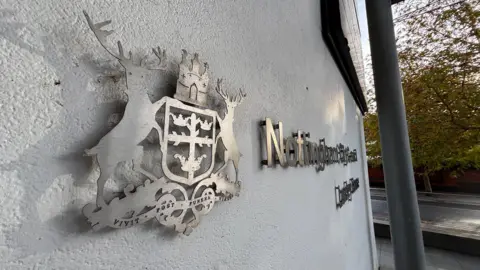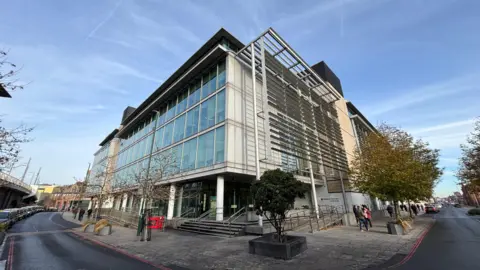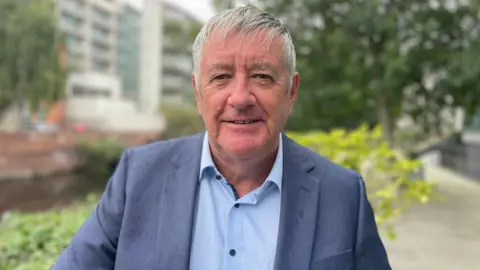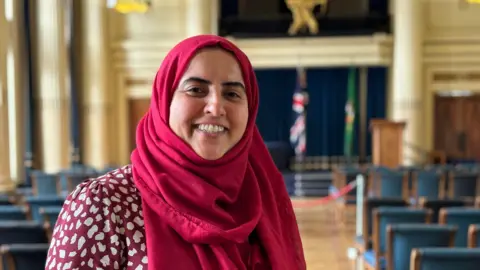What's changed at the council that went 'bankrupt'?
 BBC
BBCOne year ago, Nottingham City Council confirmed the news that many had been expecting for some time - that it had effectively gone bankrupt.
The Labour-run council joined a growing list of local authorities that have issued a section 114 notice, an acknowledgement that it could not deliver a balanced budget.
With cuts to jobs and services, a change in leadership and more uncertainty on the horizon, much has changed.
What happened a year ago?
On 29 November 2023, the section 114 notice was issued by the council's then chief finance officer, Ross Brown.
It was the formal declaration that, in his professional view, the council was unable to set a balanced budget for the 2023-24 financial year - something all councils are legally obliged to do every year.

It's commonly referred to as "effectively declaring bankruptcy", although technically a local council can't go bankrupt in the same way a business or an individual can.
Council staff continued to be paid and many council services continued as normal, at least in the short-term.
It triggered a process, however, in which all new spending had to be halted other than for services the council has to provide by law, such as social care and waste collections.
In other words, "effectively bankrupt" is an imperfect phrase - and one which some in the council objected to at the time - but it's about the closest we have that's in common use to describe what happened.
Even now, the reasons behind it vary depending on who you ask.
Labour councillors blame years of funding cuts from the previous Conservative government.
Their opponents point towards high-profile blunders, like the collapse of the council-run firm Robin Hood Energy.
All sides agree the authority has been hit by high inflation and spiralling demand for services.
It's worth noting - all of the above can be true at once.
What was the impact?
In the short-term, the council had to approve a plan to bridge a £23m gap in its budget for the 2023-24 financial year.
It was mostly done by using reserves and selling council assets.
The financial strain didn't show any signs of easing up, however.
In March, the council approved a sweeping set of cuts as it tried to overcome a further £53m budget gap for 2024-25.
Among the savings was a review of community centres, with the council ultimately seeking to remove all contributions from its operation.
Manager of the Beechdale Community Centre, Shanine Fasasi, said that when she took charge two years ago, the council met the cost of all maintenance and utilities, such as water and lighting.
She said "within months" of the section 114 notice being issued, responsibility was handed over to the centre's management, and they now have to find funding from other sources.

"Funding has become really difficult to obtain. We're not the only centre in Nottingham facing these challenges so there's a lot more people trying to access the funding pool," she said.
"Sometimes I wonder, how long can we keep doing this for?"
Another point worth noting - cuts like these are not necessarily a direct result of the section 114 notice.
It's quite possible they would have happened anyway, but it is a sign of the continued strain local authorities are under.
There is also a school of thought that the notice may never have been issued if the council had been quicker to make such savings in the years before.
What has happened since?
The short answer is - a lot.
As well as the cuts and changes to services, there are lots of new faces.
In February this year, the then Conservative government appointed commissioners to help run the council.
Commissioners have the power to intervene and overrule councillors, but so far they have not needed to.
They were initially appointed for two years - though this could be changed or extended if things don't go to plan.
Their message so far has seemed to be - things are going in the right direction, but there's a long way to go.
David Mellen quit as leader in March and was replaced by Neghat Khan two months later.
She said at the time that she knew she had a huge task on her hands, but then said in October that it was an even bigger challenge than she expected.
The other top job at the council has a new occupant too.
Sajeeda Rose was appointed as chief executive in August, saying "huge change" was still needed.
And chief finance officer Ross Brown - who issued the section 114 notice - has left to take up a position at the London borough of Bexley.

Could it happen again?
A section 114 notice only applies to a single financial year, so it is possible for it to happen more than once.
The key figure which determines it is the in-year budget gap.
At the point the notice was issued, that stood at about £23m.
A year on, the latest figure the council has provided for 2024-25 is £2.9m - I'm told this could increase in the coming weeks, but only marginally.
It still looks like a big number, but in council budget terms, it's not considered insurmountable.
And at a glance, it looks like things are moving in the right direction.
But here's the big caveat - a huge part of the gap has been made up by something called "exceptional financial support" (EFS).
That's a technical process which involves selling council assets and using the cash to fund day-to-day spending, which councils aren't usually allowed to do.
For 2024-25, £41m worth of EFS has already been applied just to get to that more manageable looking in-year deficit.
Speaking to the BBC this week, Khan said it was likely the council would have to keep doing this to balance the budget in the years ahead.

The authority has a surprisingly big portfolio of property, accumulated over many years, so there is more of that which can be sold.
It's not a sustainable solution, however, because of course you can only sell something once.
Overall though, Khan says she's "confident" a second notice can be avoided, and that she has been reassured by the new chief finance officer that "we are not in that territory".
What's likely to happen in the future?
The financial headache hasn't gone away, with demand for services continuing to rise.
Figures published earlier this year forecasted a total budget gap of £172m over the next three years.
I'm told the latest figures, which have yet to be published, have "significantly moved on" from that point.
There are all sorts of unknowns, not least because councils don't find out exactly how much money they get from central government until mid-December.
But all the signs are that, whatever happens, there will still be a big gap that needs bridging.
Other councils that have issued section 114 notices, such as Birmingham, have increased council tax by more than the usual limit.
Nottingham has so far managed to avoid such a steep rise, although council leader Khan has said council tax is something they will "have to look at".
We expect to hear details of budget proposals for the next year in the coming weeks.
Khan says the time of salami slicing is over, and instead there will need to be "radical change" to how services are delivered.
Follow BBC Nottingham on Facebook, on X, or on Instagram. Send your story ideas to [email protected] or via WhatsApp on 0808 100 2210.
